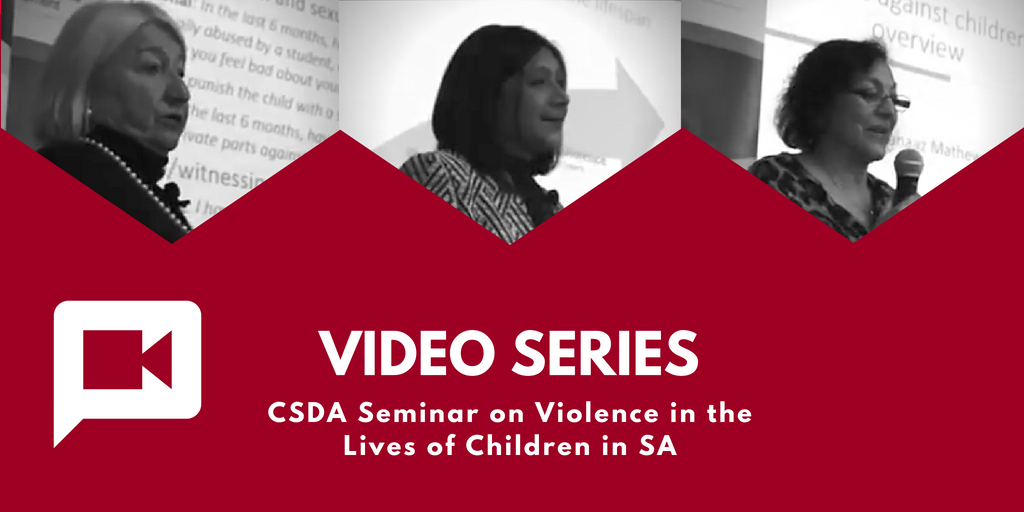
The Centre for Social Development in Africa (CSDA) at the University of Johannesburg, the DST-NRF Centre for Excellence in Human Development at Wits, and the UCT Children’s Institute co-hosted this seminar titled "Violence in the Lives of Children in South Africa" on May 15, 2018. What follows is a series of videos capturing highlights from the seminar.
BACKGROUND:
The Birth to Twenty Plus (Bt20+) study, now in its 28th year, has collected information on the lives of children and families over three generations. It is the largest and longest-running study of children’s health and development in Africa, and one of the few large-scale longitudinal studies in the world.
With extensive knowledge and experience of leading the Bt20+ study, Prof Linda Richter shares research results relating to violence in children’s lives across gender and generations. This research is critical to finding evidence-based solutions to reduce and prevent violence in children’s lives in South Africa.
Video #1 - 15 May 2018
0:00 - Prof Leila Patel, Director of the CSDA, introduces the seminar and the relevance of the topic
2:22 - Prof Shanaaz Mathews, Director of the Children's Institute, gives an overview of the research issues, mentions the Global Partnership to End Violence Against Children and introduces Prof Linda Richter as presenter of the seminar.
7:35 - Prof Linda Richter begins the seminar
Video #2
Prof Linda Richter gives an overview of the data in the longitudinal study using the Birth to Twenty Plus Study. Read the journal article here: bit.ly/2p6kfPl
Video #3
Linda Richter talks about the areas that have not yet been sufficiently researched; she also talks about the research agenda on violence that the DST-NRF Centre of Excellence in Human Development has initiated.
Video #4
Q & A Session:
- Questions about children's exposure to violence in utero; a comment about reaching men on these issues, that it is important to use an appropriate communication status for men; a men and boys strategy by the department of social development in Gauteng; a comment by a staff member of Gauteng Department of Basic Education re resilience.
- Prof Richter talks about the freeze response in foetuses in utero in response to stresses. A supportive environment during pregnancy is crucial to avoid deregulation in babies after birth. She also speaks about the growth of men's organisations in SA which is a change from the past.
- She also speaks about research on young people who have delayed starting sexual relationships.
- Prof Shanaaz Mathews speaks about research she did with male perpetrators in prison. She stresses their search outside of their home for places where they belong. She stresses interventions beginning at primary school level.
- There is then a comment on the cycle of intergenerational violence. Luke Lamprecht mentions that care has been 'maternalised'. The challenge is how paternal care is added to the care of boys and girls. He also speaks about how resilience in young men takes place.
- The next comment notes the silo approach and lack of a common trajectory about interventions. UNICEF SA has been working with Sonke Gender Justice on some of these issues, especially among social service professionals.
Video #5
Last part of the Q&A session:
- One of the participants speaks about Men's Forums that they run. Prof Thea de Wet, a health anthropologist who was present, was asked for her comments. She mentions research by a Master's student who did a project on resilience. Second-year UJ students were recruited who had had adverse experiences - the majority of the group were survivors, not of violence, but of criminality. She learned the importance of focusing on young men at varsity, about the support given to them, how little we understand about how much it takes to come to university. The average age of first years at UJ is 22 years. Particular events made young people change their life options. Research on what changes course is relevant.
- Linda Richter spoke about the exclusion of young men from ECD and Grade R teaching. The maternalisation of care is institutionalised.
- Prof Mathews also spoke about men excluding themselves from research and work about children. Prof Mathews also mentioned research on pathways for men to taking on caring masculinity, and early experiences of caring were very important in shaping them in this regard.
- There was then a comment from an education faculty person about difficulties recruiting men into the discipline of educational psychology.
- Prof Leila Patel ends off with a summary of the main concerns. There is a vast research agenda for this area. Prof Richter mentions a recent DPME report and emphasises the crucial importance of political will on these issues.
